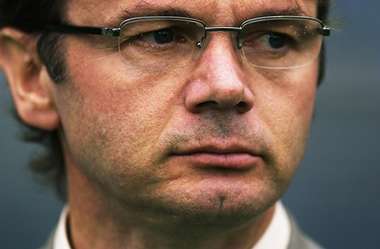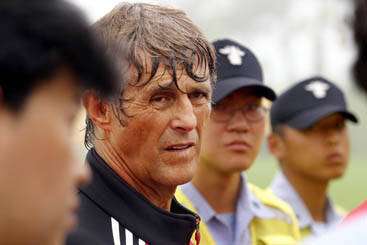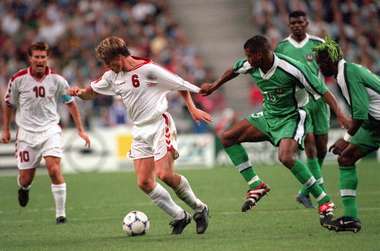ANALYSIS
By Solace Chukwu
In order to get a sense of what the expectation around the Super Eagles was like leading up to the 1998 World Cup in France, it is worthwhile to consider what went before.
Four years earlier, Nigeria had made their bow on the world stage. A second round exit in attritional fashion to eventual finalists Italy was more than respectable, considering the manner in which the team played. At the 1996 Olympics in Atlanta, a good number of that ’94 team also played a major part in securing the gold medal, an unprecedented achievement highlighted by come-from-behind victories over Brazil and Argentina.
The expectation was that the world was seeing the birth of a new footballing superpower, and that the 1998 World Cup would see another rubicon crossed on the journey to world domination. It was not to be, however.
The Super Eagles hit a trough in the Second Round loss to Denmark, and have been on a downward slide ever since.
Where exactly did it all go wrong?

Troussier | Ejected
Well, take your pick. To begin with, the curious termination of manager Philippe Troussier, having qualified the team for the showpiece with a game to spare, was a mark of the overbearing political and bureaucratic situation that bedeviled the country’s football administration. In his place, Bora Milutinovic was brought in six months before the World Cup. The Serb had a reputation as a mercenary, albeit one with the ability of the ‘quick fix’, having taken Mexico, Costa Rica and the United States beyond the first round against long odds in consecutive World Cups.
There is a case to be made that he was the wrong choice, both strategically and with the benefit of hindsight.
Nigeria was a team on the way up, in contrast to all the others on Milutinovic’s CV for whom anything bar humiliation was welcome at the time. He excelled at defying modest expectation. Nigeria needed a progressive forward-thinker with a clear vision: Troussier, the ‘White Witch Doctor’ had one. Milutinovic was a troubleshooter.
Then again, there was the issue of injuries to and omissions of certain players who had been key in the qualifying process. The strike pair of Daniel Amokachi and Jonathan Akpoborie played four of six qualifying matches; the latter was not selected for the tournament, the former was but clearly struggled for fitness due to injury. Emmanuel Amuneke, star in 1994 and scorer of the Olympic gold medal-winning goal in Atlanta was in the throes of persistent knee injuries. Goalkeeper Joseph Dosu was involved in a horrendous auto crash that curtailed his career.

Bora | The Wrong Choice
Losses in pre-tournament friendlies to Germany, Yugoslavia and the Netherlands highlighted two key squad problems: goalkeeper and right back.
First-choice Ike Shoronmu was desperately unfortunate to break his hand in the final game of the season at club side FC Zurich; his deputy Abiodun Baruwa had a poor outing against Yugoslavia, and the veteran Peter Rufai let in five goals against the Dutch. His call-up alone was an indication of the seriousness of the problem, as he had been on his way to vacation.
The right back position was also a worry.
Mobi Oparaku started three of the six qualifiers, including the last two under Troussier, but seemed not to have the trust of Milutinovic. It was only after the injury to Jero Shakpoke in the friendly loss to the Netherlands that he was recalled to the team. The fact that four of the five Dutch goals came from simple lofted balls played in behind the right back was an early warning sign. Oparaku started the tournament’s first game against Spain, but was dropped thereafter.
The final problem was in the centre of midfield, and was in a way a result of the issues at right back. In the shock win over Spain, the Super Eagles started in a 4-1-4-1 shape, Sunday Oliseh was the holding player, and Mutiu Adepoju played as a ball-winner-cum-sporadic shuttler alongside Jay-Jay Okocha.

Oliseh | Overworked
It did not work so well, largely because the team was not comfortable playing that way and left Victor Ikpeba incredibly isolated upfront. For the next game against Bulgaria, Adepoju went to right back (presumably Oparaku had not performed satisfactorily) and Amokachi came in, shifting the team to 4-4-2. Nigeria got the win, but the game was amazingly open and end-to-end, with neither side exerting proper control.
In spite of this, the open, loose 4-4-2 remained. Oliseh was at the height of his powers and superb at calm distribution, but his pairing with Okocha was a ticking time bomb.
The Fenerbahce-based magician, basically licensed to go wherever he pleased, was never positionally-disciplined (perhaps why he never played for a truly top side), and simply had too much responsibility: ball-carrier, creator and off-the-ball runner. In a three-man midfield, he could be indulged. In a midfield two, it was suicide.
These deficiencies and problems came to a head against Denmark in the Second Round. The Danes went ahead in the third minute, through Peter Moller. Denmark lined up 4-3-1-2, and Martin Jorgensen played the role of right-sided shuttler excellently all game long. The opening goal highlighted the midfield problems: Jorgensen drifted out to the flank, as did Brian Laudrup; the movement off the latter dragged Celestine Babayaro out to the touchline, opening up space in the inside left channel; Michael Laudrup saw the space and ran into it from deep; Okocha, who was closest to him, did not track the run at all. Looseness in midfield stemmed from Okocha’s lack of defensive contribution.
Individually, Okocha put on a clinic and played out of his skin, and this is by no means a criticism of him as a player. Instead, it was a damning indictment of the tactical nous of Milutinovic that he did nothing to address Denmark’s quick transitions, which constantly caught out the overworked Oliseh. The Danes defended deep and attacked swiftly behind Okocha and Babayaro.
Adepoju at right back meant the midfield lacked structure; the injury woes of Amokachi meant a rusty Nwankwo Kanu was thrust in at the deep end; Rufai looked off the pace in goal; and the limitations of Bora Milutinovic were shown up: it is unlikely any manager would succeed with six months to prepare, but the Serb’s choices showed that he did not have the chops to manage under the weight of true expectation.
Football at international level is frequently brutal.
France ’98 should have been the consolidation of Nigeria’s rising profile in world football. Instead, the Super Eagles missed the train, stagnated and have gone inexorably backwards since then.
